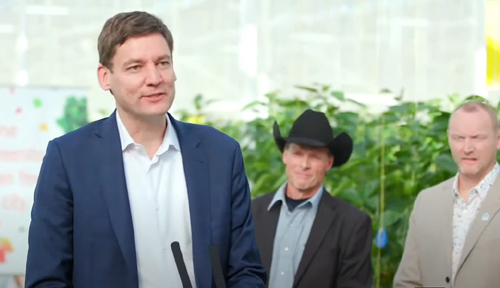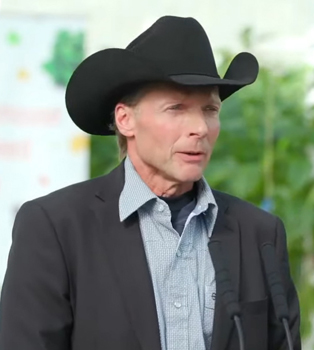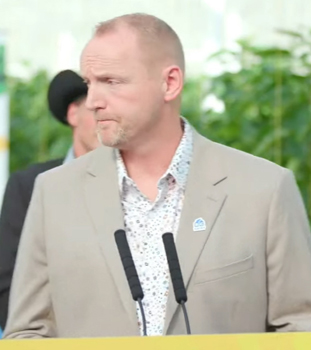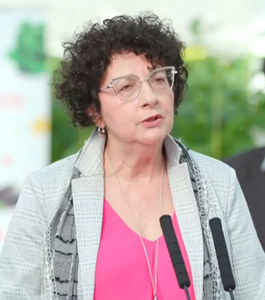
Monday March 18, 2024 | DELTA, BC
by Mary P Brooke | Island Social Trends
The costs of failing to act are huge, said Premier David Eby today during his announcement about improving water infrastructure management.
Together with Agriculture and Food Minister Pam Alexis, the premier emphasized the importance of being proactive about dealing with drought conditions as relate to food-growing and overall food security in British Columbia.
Funding announcement:
$83 million will be available from the province to put slews and other infrastructure in place to protect ranches and farms, notably in the Fraser Valley area.
- BC farmers will be able to access $80 million in funding through the Agricultural Water Infrastructure Program to make irrigation more efficient, or to build infrastructure to improve water availability and storage. These actions will benefit stream flows, fish populations and support more sustainable food production.
- Another $3 million will go toward regional workshops that will provide demonstrations, education, best practices and tools for water and irrigation use specific to drought-affected communities.

Premier’s remarks:
“We cannot sit by and let our farmers deal with a lack of water,” said Eby.
“If we don’t we’re going to be very hungry in BC,” he added to emphasize the importance of water management for agriculture, even though clearly a large proportion of food sold to British Columbians has been imported from other parts of Canada, North America, and the rest of the world.
Underlying deep drought conditions are remaining in 2024. Early snow melt and warmer temperatures this spring will exacerbate agricultural challenges.
Cattlemen’s and Dairy:
The Premier and Agriculture Minister were joined today by representatives of the BC Cattlemen’s Association and the BC Dairy Association.

“A healthy ecosystem is hard to maintain without a dependable supply of water,” said Werner Stump, rancher, and vice-president, BC Cattlemen’s Association.
“Nature does not always give us enough water when we need it, so we must manage it through storage to create a secure food supply especially in times of drought. This investment goes beyond a benefit to agriculture as the same infrastructure will also reduce the risk of flooding, a benefit to all British Columbians,” said Stump.

“In order to grow healthy crops to feed our cattle, and in turn provide nutritious, local dairy products for communities around our province, dairy farmers need predictable and reliable access to water,” said Casey Pruim, dairy farmer, and chair, BC Dairy Association.
“On behalf of our members, we are grateful for the investment the B.C. government is making in water infrastructure and storage to increase availability for farmers,” said Pruim.
Water Supply Association:
“The Water Supply Association of BC is very pleased to see the Province continue with the program for water infrastructure,” said Bob Hrasko, chair, Water Supply Association of BC in today’s news release.
“The projects in the southern Interior that were awarded funds in 2023 will form the foundation for an increased irrigated agricultural land base. The significant increase in funding for 2024 is a positive step and we look forward to seeing continued success with this program,” said Hrasko.
Today’s announcement:
Hundreds of B.C. farmers will be better equipped to deal with drought with supports to help manage, collect and store water for crops and livestock, says the government’s news release today.
“Last year, our province faced an unprecedented lack of rain, and this winter we’re seeing snow levels are at remarkable lows, meaning next summer might be even worse,” said Premier David Eby.
“Climate change – and drought in particular – makes it tough to secure water for animals, crops and feed, and it makes food more expensive for everyone. Our government heard the call for help from farmers. This money will help build water storage and buy the equipment farmers tell us they need to keep providing the food we all depend on.”
B.C. farmers will be able to access an additional $80 million in funding through the Agricultural Water Infrastructure Program to make irrigation more efficient, or to build infrastructure to improve water availability and storage.
These actions will benefit stream flows, fish populations and support more sustainable food production.
Climate change impacting food security:
“Climate change is impacting both water and food security for people in British Columbia, making it challenging for farmers’ livelihoods and affecting local food systems,” said Pam Alexis, Minister of Agriculture and Food. “This is why we’re providing enhanced support to improve on-farm and community water infrastructure so we can grow more food and ensure proper water management during potential floods and drought.”
Launched in June 2023, with an initial $20-million fund, the program is funding 108 projects ranging from water storage, such as agricultural dams and dugouts, to improved water-supply systems for irrigation and livestock. It’s expected the additional funding will benefit hundreds more farmers.
On the territory of the Lheidli T’enneh in Newlands, northeast of Prince George, Hope Farm Organics has been able to increase its water supply through the program, allowing them to grow more fruits and vegetables.
Two programs:
The B.C. government is providing as much as $80 million to expand the Agriculture Water Infrastructure Program, which had previously received one-time funding of $20 million.
- Agricultural producers can apply for funding starting in early April for smaller-scale on-farm projects through the Beneficial Management Practices program.
- Applications for larger farm projects and more complex community-based projects will open in May through the Agricultural Water Infrastructure Program.
Both programs are administered by the Investment Agriculture Foundation of BC.
An additional $3 million will go toward the Agricultural Drought Resource Extension Program to provide support for regional workshops and on-farm demonstrations.
Resilience provides confidence:
“With uncertain times in changing climate patterns and weather extremes, the Agriculture Water Infrastructure Program helped our vegetable and fruit farm become more resilient in the face of these extremes,” said Andrew Adams, owner, Hope Farm Organics.
“This resilience has given me the confidence to continue developing and expanding our crops into the future, which ultimately will help improve British Columbia’s food security and the sustainability of our farm. Water is life,” says Adams.
Support for Delta:
The City of Delta received $2 million, which is helping improve the efficiency of the local irrigation system. These enhancements will help ensure water keeps flowing to farmers in times of drought and reinforces food security for people in the region.
“The support our city has received from the BC government’s Agricultural Water Infrastructure Program has been instrumental in facilitating crucial irrigation upgrades, greatly benefiting our valued farming community,” said George V. Harvie, mayor of Delta.
“This strategic investment not only bolsters water security but also plays a vital role in fostering resilience and sustainability within our local food supply chain.”
Workshops & demos:
Another $3 million will go toward regional workshops that will provide demonstrations, education, best practices and tools for water and irrigation use specific to drought-affected communities. This is in addition to the Agricultural Water Management Workshops and Drought Management Engagement Sessions that government staff have been leading in close to 30 communities throughout the province over the past month and continuing in the weeks ahead.
Ministry staff:
Ministry of Agriculture and Food staff are working with partners in the agricultural sector on allocation of funding for the larger strategic projects.
Federal support:
Earlier this month, local MP Alistair MacGregor (Cowichan-Malahat-Langford) wrote to the federal Agriculture and Agri-Food Minister Lawrence MacAuluay to highlight the risk of extreme drought that threatens so much of Canadian agriculture this season. “It is imperative that the government be proactive in meeting this challenge on behalf of Canadian farmers and ranchers,” said MacGregor in his March 6 letter.
MacGregor is the NDP critic for Agriculture and Agri-Food.









